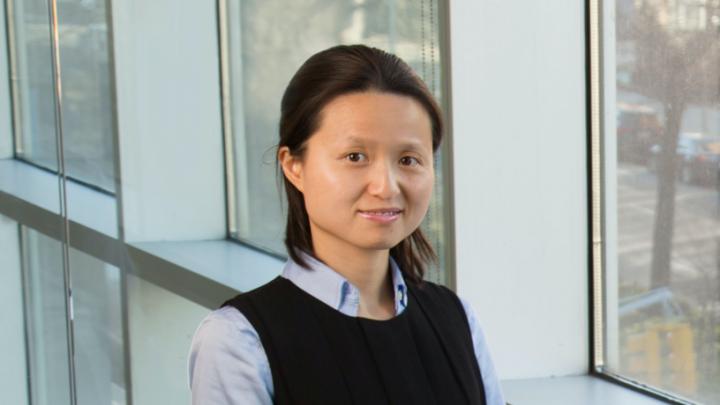Using optimization, game theory, and data analytics, Di will model a framework to improve transportation ecosystems of the future

Credit: Jeffrey Schifman/Columbia Engineering
Sharon Di, assistant professor of civil engineering and engineering mechanics, has won a National Science Foundation CAREER Award for her work in the nascent field of autonomous vehicles and shared mobility transportation, areas rapidly being transformed by emerging communications and sensing technologies. The five-year $584,137 grant will support her project, “Multi-scale Multi-population Mean Field Game-Theoretic Framework for the Autonomous Mobility Ecosystem.”
Di balances theory and application to develop new theories and models in transportation engineering that will help transportation planners and managers maximize efficiency and sustainability. A committee member of the Data Science Institute’s Center for Smart Cities, Di applies optimization, game theory, and AI to large data sets collected from various types of traffic sensors, including individual tracing devices such as GPS. Her travel behavior research is focused on a broad range of factors from congestion pricing to ride-hailing services like Uber as well as the future role of connected and automated vehicles (AVs).
“I am very happy and proud to receive such an honor,” says Di. “With this NSF award, I will leverage my expertise in travel behavioral modeling and network optimization to develop a new framework that brings together the fields of game theory, dynamic control, data science, and transportation engineering. I hope to help reshape technological innovation for social good and encourage the next-generation of students into becoming civic-minded technologists.”
The goal of Di’s project is to advance fundamental understanding of the equilibria of the future transportation ecosystem and its controls–planning and policy–needed to guide the ecosystem toward a social optimum. Current human-driven vehicles, new autonomous vehicles (AVs), AV manufacturers, and transportation network companies (TNCs or rideshare organizations) will constantly interact with one another, often with competing and selfish goals, pushing the system in directions that existing models may fail to predict.
“These competing goals could lead to undesirable policies that jeopardize social welfare,” says Di. “There is a pressing need for a paradigm shift in our fundamental understanding of mixed traffic now made up of AVs and human-driven vehicles. Our transportation systems community urgently needs a novel modeling and simulation platform to project future mixed-traffic dynamics and assist in socially optimal policy-making.”
Working closely with an advisory committee of leaders from Columbia’s Data Science Institute, the NYC Department of Transportation and Didi Chuxing, a Chinese AI and autonomous technology-based TNC, Di plans to develop a game-theoretic model where each AV selects its best strategies in car-following, lane-changing, and routing behavior: this will help her to further investigate AV manufacturers’ role in influencing future traffic via design of autonomous driving algorithms. She is also studying the impact of TNC drivers’ passenger-seeking behavior on traffic congestion as well as promoting partnerships among academia, DOTs, and the AV industry to design socially optimal policies for infrastructure planning and the regulation of technology.
Real-time traffic experiments are, of course, not just costly but highly risky to perform. So Di is developing a scalable, innovative game-theoretic tool originating from dynamic control and economics–mean field game (MFG)–to dynamically model a complex system composed of a very large number of interacting agents who individually have a very small impact on the outcome. Mean field approximation allows for the translation of agents’ microscopic behaviors and interactions at a macroscopic level. Most importantly, MFG embodies classical traffic flow models with behavioral interpretation, thereby providing a flexible behavioral foundation to accommodate the new traffic entities like AVs and TNCs.
Once her tool is built, she will test it out on Columbia’s COSMOS testbed, a living lab for advanced 5G and wireless research in West Harlem. “If we’re going to game the traffic, we need to be able to empower artificial intelligence for AVs,” she explains. “Instead of hypothesizing explicitly how AVs drive, we need to design future AVs to act as rational, utility-optimizing agents that play best strategies at each level of choice by solving optimal control problems.”
Di will also use her tool to consider the interdependency between transportation and other systems of smart cities, adding: “This project will help New York City planners and regulators better understand the potential consequences of AV and related technologies on traffic safety and efficiency, and will, in turn, help prepare them for the transition to future smart cities.”
###
Media Contact
Holly Evarts
[email protected]
Original Source
https:/




